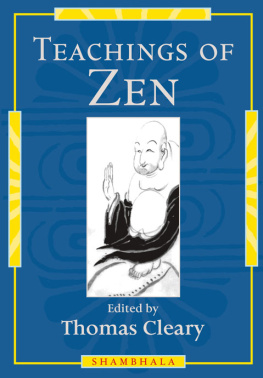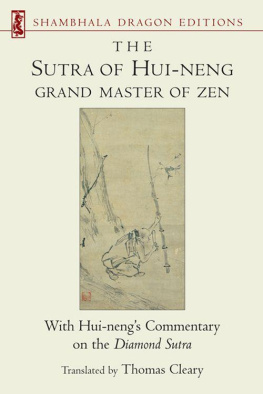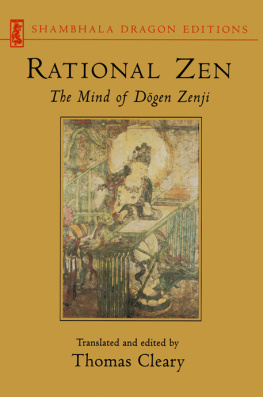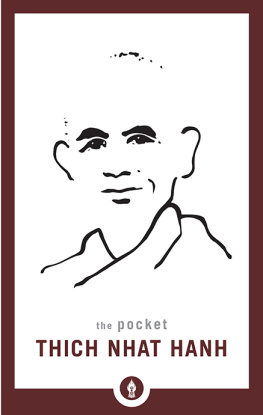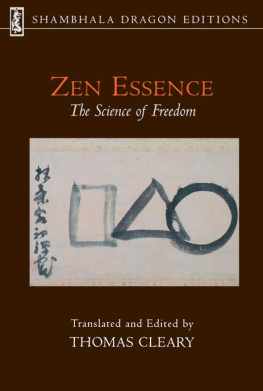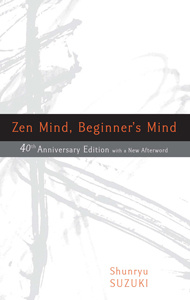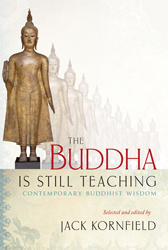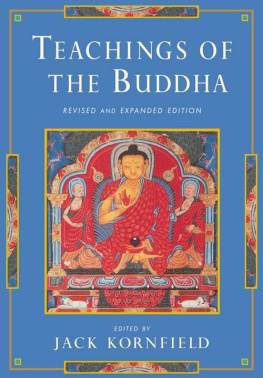ABOUT THE BOOK
Zen Buddhism emerged in China some fifteen centuries ago and remained the most dynamic and influential spiritual movement in Asia for more than a millennium. Though the teachings of the first Zen masters are sometimes considered innovative, they were actually a return to the core of Buddhist teaching and to an understanding of the importance of the personal experience of enlightenment.
This anthology presents talks, sayings, and records of heart-to-heart encounters to show the essence of Zen teaching through the words of the Zen masters themselves. The selections have been made from the voluminous Zen canon for their accessibility, their clarity, and above all, their practical effectiveness in fostering insight.
THOMAS CLEARY holds a PhD in East Asian Languages and Civilizations from Harvard University and a JD from the University of California, Berkeley, Boalt Hall School of Law. He is the translator of over fifty volumes of Buddhist, Taoist, Confucian, and Islamic texts from Sanskrit, Chinese, Japanese, Pali, and Arabic.
Sign up to receive weekly Zen teachings from Shambhala Publications.

Or visit us online to sign up at shambhala.com/ezenquotes.
Teachings of
ZEN
Compiled and translated by
Thomas Cleary

Shambhala
Boston & London 2015
Shambhala Publications, Inc.
Horticultural Hall
300 Massachusetts Avenue
Boston, Massachusetts 02115
www.shambhala.com
1998 by Thomas Cleary
Cover art: One Hand Clapping by Hakuin Ekaku. Reproduced courtesy of Stephen Addiss.
All rights reserved. No part of this book may be reproduced in any form or by any means, electronic or mechanical, including photocopying, recording, or by any information storage and retrieval system, without permission in writing from the publisher.
Library of Congress Cataloging-in-Publication Data
Teachings of Zen/compiled and translated by Thomas Cleary.
p. cm.
Includes bibliographical references.
eISBN 978-0-8348-3022-6
ISBN 1-57062-338-4 (pbk.: alk. paper)
1. Zen BuddhismQuotations, maxims, etc. I. Cleary,
Thomas F., 1949
BQ9267.T43 1988
294.3927dc21 97-23349
CIP
Z en Buddhism emerged in China some fifteen centuries ago, to become one of the most dynamic spiritual movements of Asia for more than a thousand years.
After generations of experimentation with Buddhism, Zen masters found that enlightenment cannot be attained simply by literal adherence to dogma, or by mechanical performances of fixed systems of practices.
Returning to the source of Buddhism in personal experience of enlightenment, Zen teaching emphasized the liberation of subtle mental capacities from bondage to conditioned thinking habits and crude psychological propensities.
Conventional religious formats had externalized Buddhist teachings in the forms of myth, doctrine, and ritual. Zen masters internalized Buddhist teachings as allegories for perceptions, practices, and experiences of metaphysical principles, mental postures, psychological processes, psychic states, and spiritual capacities.
In projecting such interpretations of Buddhism, Zen teachers were not really innovating but concentrating on certain core teachings of the Buddhist scriptures. Even the hallmark Zen teaching that mind is Buddha is not a Zen invention, but is found in scriptural sources.
Although they have been called iconoclastic, Zen masters did not oppose the practice of conventional religion, except where obsession with formalities of dogma and ritual inhibited spiritual experience of formless truth.
On a deeper level, Zen masters sought to restore and express the living meaning of religion and philosophy; the Zen teaching was to study the living word, not the dead word. Not only did Zen reawaken Buddhism in this way, but it also revitalized Taoism, Confucianism, Shintoism, and shamanism, bringing out their higher spiritual dimensions.
The essentialist approach to Zen in practical presentation of the classical allegories and principles of Buddhism is illustrated with unparalleled clarity and simplicity by the great master Bankei (16221693), who had both Chinese and Japanese teachers but claimed to have rediscovered the spiritual reality of Zen through his own experience:
When we look back on this life, we see that when people are born, no one has thoughts of joy, sadness, hatred, or bitterness. Are we not in the state of the buddha mind bequeathed by our parents? It is after birth that intelligence develops, and people learn bad habits from others in the course of seeing and hearing them. As they grow up, their personal mental habits emerge, and they turn the buddha mind into a monster because of biased self-importance.
People are born with nothing but the unconceived buddha mind, but because of self-importance they want to get their own way, arguing and losing their temper yet claiming it is the stubbornness of others that makes them mad. Getting fixated on what others say, they turn the all-important unique buddha mind into a monster, mulling over useless things, repeating the same thoughts over and over again. They are so foolish they will not give up on things even if getting their own way would in any case prove to be futile. Folly is the cause of animality, so they are inwardly changing the all-important unique buddha mind into a paragon of animality.
Everyone is intelligent, but through lack of understanding they turn the buddha mind into all sorts of thingshungry ghost, monster, animal. Once youve become an animal, even if you hear truth you dont listen, or even if you do listen, being animal-like, you cant retain what youve heard.
Going from one hellish state to another, from one animalistic state to another, from one ghostly state to another, from darkness to darkness in an endless vicious cycle, you go on experiencing infinite misery for the bad things you have done, with never a break.
This can happen to anyone, once youve gone astray. Just understand the point of not turning the buddha mind into something else.
As soon as a single thought gets fixated on something, you become ordinary mortals. All delusion is like this. You pick up on something confronting you, turn the buddha mind into a monster because of your own self-importance, and go astray on account of your own ego.
Whatever it is confronting you, let it be. As long as you do not pick up on it and react with bias, just remaining in the buddha mind and not transforming it into something else, then delusion cannot occur. This is constant abiding in the unconceived buddha mind.
Everyone makes the mistake of supposing that acquired delusions produced by selfish desire and mental habits are inborn, and so they are unable to avoid confusion....
As I listen to the people who come to me, all of them make the mistake of turning the buddha mind into thoughts, unable to stop, piling thoughts upon thoughts, resulting in the development of ingrained mental habits, which they then believe are inborn and unalterable.
Please understand; this is very important. Once you have unconsciously drifted into delusion, if your state of mind degenerates and you flow downward like a valley stream in a waterfall, there is no way back after you have fallen into vicious cycles.
Again, suppose that you have developed mental habits based on selfish desires. When people criticize things that suit your selfish mentality, you become angry and defensivesince they are, after all, bad thingsand you rationalize them as good. When people praise things that do not suit your selfish mentality, you reject thembeing, of course, good thingsand you retort that they are bad.
Next page
